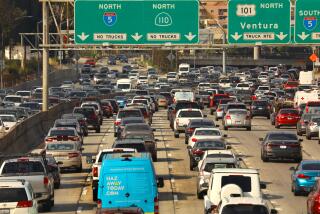Higher Daytime Port Fees May Be Sought
A special panel of port officials and businesses may recommend in mid-January that shippers pay higher fees to move cargo out of the ports of Los Angeles and Long Beach during the day in hopes of making off-peak transport more attractive.
The idea is being floated amid public outcry over growing truck traffic on area freeways. Most port terminal gates are open between 8 a.m. and 5 p.m. on weekdays, meaning that port cargo is moved inland during peak commuting hours. Only 17% of that cargo moves at night and on weekends.
Propelled by concerns over congestion, truck-car collisions and air pollution, the panel began meeting last fall to explore how to promote cargo transport at night, when some key area freeways are largely deserted.
“This is something we can do right now that will ease traffic -- on the 10, on the 15, on the 60. On all the arteries coming into the port area, congestion will be significantly reduced,” said Councilwoman Janice Hahn, who represents the harbor area and who spearheaded the new panel’s creation.
Some key international shippers support keeping port gates open on nights and weekends. Officials at Wal-Mart, one of the world’s largest shippers, said the company is willing to alter its schedules to ease congestion.
“We are committed to doing whatever we can to move some freight traffic to off-peak hours,” Wal-Mart spokeswoman Sarah Clark said Friday at the company’s Bentonville, Ark., headquarters. Officials of the Waterfront Coalition, a group of major retailers and other shippers, say that its members have agreed to move a considerable amount of freight at off-peak hours.
The groundswell of interest in longer gate hours is a marked change from a year ago, when officials at both ports expressed doubt that shippers, ocean carriers and other companies would embrace such changes.
“People are recognizing that the industry has to come up with a plan,” said Harbor Commissioner James Acevedo, who co-chairs the special panel studying how to promote off-peak shipping.
Public pressure has mounted in recent months with a high-profile series of fatal truck-car collisions as well as community opposition to expanding the Long Beach Freeway, the busiest freeway serving the two ports. That prompted some elected officials to speak out, and state Assemblyman Alan Lowenthal (D-Long Beach) plans to hold a Jan. 23 public hearing on the issue.
Most truck-related collisions on the Long Beach Freeway occur on weekdays between 8 a.m. and 4 p.m., when port gates are open, according to California Highway Patrol statistics for 1992-2000. Fully 1,042 collisions took place on Thursdays, compared with 212 on Sundays. A total of 1,882 accidents took place between 8 a.m. and noon, compared with 152 between midnight and 4 a.m.
The Los Angeles-Long Beach port complex is one of the busiest in the world. Port cargo tripled in the 1990s and is expected to triple again by 2025.
The Long Beach Freeway, which carried 47,285 trucks per weekday in 2001, is projected to carry 99,300 trucks daily by 2020.
Some officials expected port-related traffic congestion to ease with the 2002 opening of the Alameda Corridor, a much-touted rail corridor linking the ports with downtown Los Angeles rail yards. But the corridor is carrying a smaller share of port cargo than anticipated, especially with the increase in traffic to warehouses in the Inland Empire.
Hopes that a rebuilt Long Beach Freeway could aid in port growth faded last summer when area residents opposed expansion plans and the chances of federal and state funding became less likely.
So Hahn came forward with a council resolution that challenged the ports to develop a plan to keep terminal gates open during nights and weekends.
That motion in turn led to the creation of a special working group that is studying the issue. About 60 representatives of port interests -- including ocean carriers, terminal operators and trucking companies -- attended the group’s December meeting to discuss how to make a schedule shift more attractive to port businesses.
Most members concurred that economic incentives -- such as imposing a premium on moving goods during the day -- would be the most effective way to keep gates open on evenings and weekends, officials said.
But the panel is not expected to make a specific recommendation until its Jan. 15 meeting. Also uncertain is who would pay a premium if one is imposed, or where the money would go.
Some of the biggest concerns about off-peak gates have been raised by the Pacific Maritime Shipping Assn., which represents ocean carriers, terminal operators and stevedoring firms. The group has warned that if shippers are not fully committed to extended gate hours, mandating such a shift would impose unfair economic penalties on marine terminals.
Tom Teofilo, the association’s vice president, said Friday he is not necessarily opposed to the idea of economic incentives to promote extended hours.
“It would be important for me to know who pays, through what mechanism, and who benefits,” he said. “These are the delicate issues -- and I emphasize, delicate issues -- that are being considered by all parties right now.”
Teofilo expressed concern about the potential impact of late-night shipping on small and medium shippers that -- unlike Wal-Mart -- might not be open to receive shipments from the ports at night or on weekends.
He added, however, that port interests are working together to find a solution.
“The marine terminals want to do what’s right,” Teofilo said. “They recognize the congestion on the freeways must be addressed in some way, and they’re willing to do their part.”






